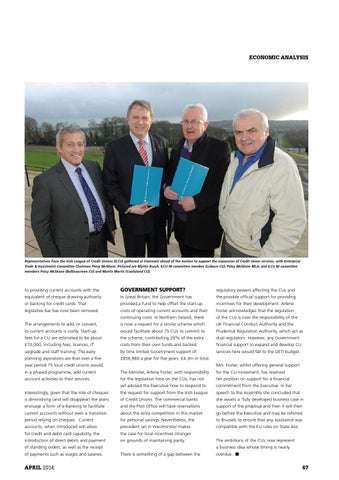ECONOMIC ANALYSIS
Representatives from the Irish League of Credit Unions (ILCU) gathered at Stormont ahead of the motion to support the expansion of Credit Union services, with Enterprise Trade & Investment Committee Chairman Patsy McGlone. Pictured are Martin Busch, ILCU NI committee member (Lisburn CU); Patsy McGlone MLA; and ILCU NI committee members Patsy McShane (Ballinascreen CU) and Martin Morris (Coalisland CU).
to providing current accounts with the equivalent of cheque drawing authority or backing for credit cards. That legislative bar has now been removed. The arrangements to add, or convert, to current accounts is costly. Start-up fees for a CU are estimated to be about £70,000, including fees, licences, IT upgrade and staff training. The early planning aspirations are that over a five year period 75 local credit unions would, in a phased programme, add current account activities to their services. Interestingly, given that the role of cheques is diminishing (and will disappear) the plans envisage a form of e-banking to facilitate current accounts without even a transition period relying on cheques. Current accounts, when introduced will allow for credit and debit card capability, the introduction of direct debits and payment of standing orders, as well as the receipt of payments such as wages and salaries.
APRIL 2014
Government support? In Great Britain, the Government has provided a fund to help offset the start-up costs of operating current accounts and their continuing costs. In Northern Ireland, there is now a request for a similar scheme which would facilitate about 75 CUs to commit to the scheme, contributing 20% of the extra costs from their own funds and backed by time limited Government support of £856,960 a year for five years: £4.3m in total. The Minister, Arlene Foster, with responsibility for the legislation here on the CUs, has not yet advised the Executive how to respond to the request for support from the Irish League of Credit Unions. The commercial banks and the Post Office will have reservations about the extra competition in this market for personal savings. Nevertheless, the precedent set in Westminster makes the case for local incentives stronger on grounds of maintaining parity. There is something of a gap between the
regulatory powers affecting the CUs and the possible official support for providing incentives for their development. Arlene Foster acknowledges that the regulation of the CUs is now the responsibility of the UK Financial Conduct Authority and the Prudential Regulation Authority, which act as dual regulators. However, any Government financial support to expand and develop CU services here would fall to the DETI budget. Mrs. Foster, whilst offering general support for the CU movement, has reserved her position on support for a financial commitment from the Executive. In her speech to the Assembly she concluded that she awaits a ‘fully developed business case in support of the proposal and then it will then go before the Executive and may be referred to Brussels to ensure that any assistance was compatible with the EU rules on State Aid. The ambitions of the CUs now represent a business idea whose timing is nearly overdue.
67
